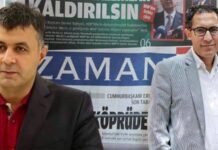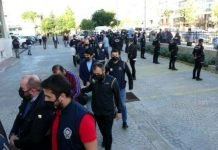The fact that the Interpol General Assembly will meet in 2021 in İstanbul is a serious blow to the credibility of Interpol, which facilitates worldwide police cooperation and crime control, Turkish Minute reported, citing a report published on Monday by The Heritage Foundation.
The 89th annual meeting of the Interpol General Assembly (GA) will be held November 23–25, 2021, in İstanbul.
According to the report, written by Ted Bromund, a Senior Research Fellow in Anglo-American Relations, Interpol faces criticism for failing to avoid becoming an instrument of political oppression for autocratic regimes.
“While Russia’s abuse of Interpol is better known, and China’s abuse is more subtle and effective, no nation in the world has likely attempted a greater volume of Interpol abuse than Turkey has,” the report said.
The report refers to a failed coup in 2016 since after the abortive putsch, which is blamed on the Gülen movement by Turkish authorities, Ankara started a massive crackdown on the real or perceived enemies of the government.
“Turkey has unleashed a wave of repression against its enemies (real or imagined) around the world, including the blatant politicization of Interpol. Turkish authorities complain publicly that Interpol has refused to publish hundreds of Red Notices it requested and that it has blocked Turkey’s ability to cancel the passports of its targets,” the report said.
According to the report, it is not clear precisely how many abusive requests Turkey has made to Interpol.
“In 2017, Turkish media reported that Interpol had blocked Turkish efforts to add 60,000 individuals to Interpol’s main database. If accurate, this would certainly be the most egregious case of attempted abuse in Interpol’s history. In June 2021, Turkey’s deputy foreign minister confirmed that Interpol had rejected 773 Red Notice requests from Turkey, a figure that still represents one of the most, if not the most, significant efforts to commit Interpol abuse in its history,” the report said.
Turkey successful in abusing Interpol
“Regardless of its dissatisfaction with Interpol, the fact remains that the Turkish regime has enjoyed considerable success in perpetrating abuses through Interpol,” the report said, citing the examples of Turkish NBA star Enes Kanter, whose career was disrupted when his passport was canceled, and Selahaddin Gülen, a nephew of the cleric who inspired the movement and whom Ankara blames for the 2016 coup attempt, who was illegally transferred from Kenya to Turkey.
The report underlined that Interpol is only allowed to concern itself with ordinary law crimes and is not a venue for pursuing political justice or military crimes.
Erdoğan set to exploit the İstanbul meeting
According to the report, experts warn that Turkish President Recep Tayyip Erdoğan is preparing to exploit the Interpol General Assembly meeting.
“It (the Erdoğan government) has reportedly prepared presentations and fabricated documents based on statements extorted from supposed participants in the July 15 coup attempt for review by representatives at the GA. It has also invited the representatives’ families to the GA meeting at Turkey’s expense and is preparing to shower them with gifts. Its goal is reportedly to convince and bribe the GA into accepting that the individuals it is pursuing though Interpol are legitimate targets,” the report said.
According to the report, “autocracies such as Turkey” like to host major international meetings, which give them prestige and credibility.
According to a report by the Stockholm Center for Freedom, the Turkish government, under President Erdoğan, has used the International Notice System, such as Red Notices and diffusions, to target political opponents who have done nothing more than criticize the government.
Similarly, it has also abused Interpol’s Stolen and Lost Travel Documents Database (SLTD) by filing tens of thousands of notifications for critics and opponents who, in many instances, were not even aware that their passports had been invalidated. In several cases, some of these people were stranded at international airports or put in detention before they were released or, in the worst cases, were handed over to Turkish operatives and ended up in Turkish prisons.
















